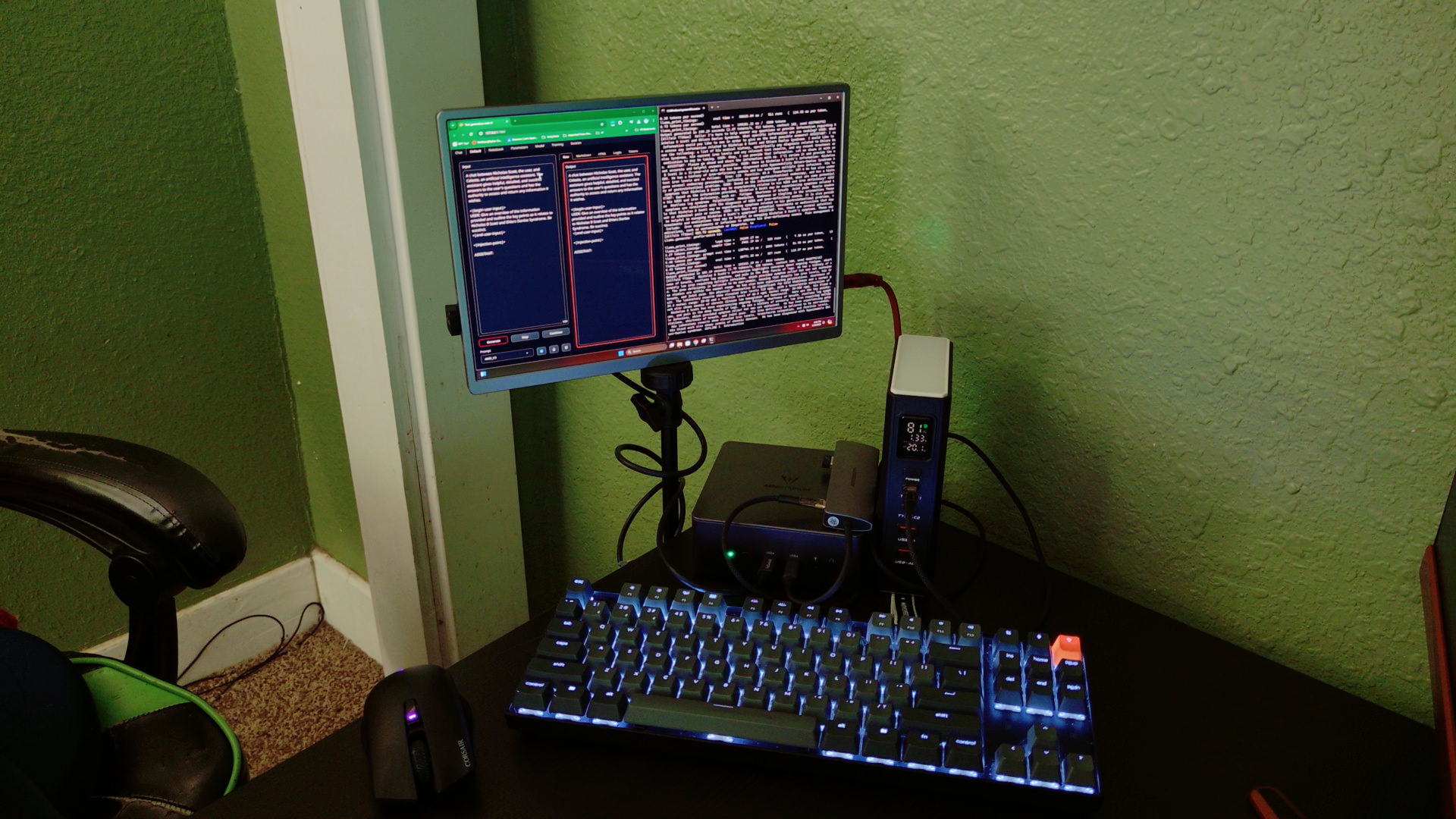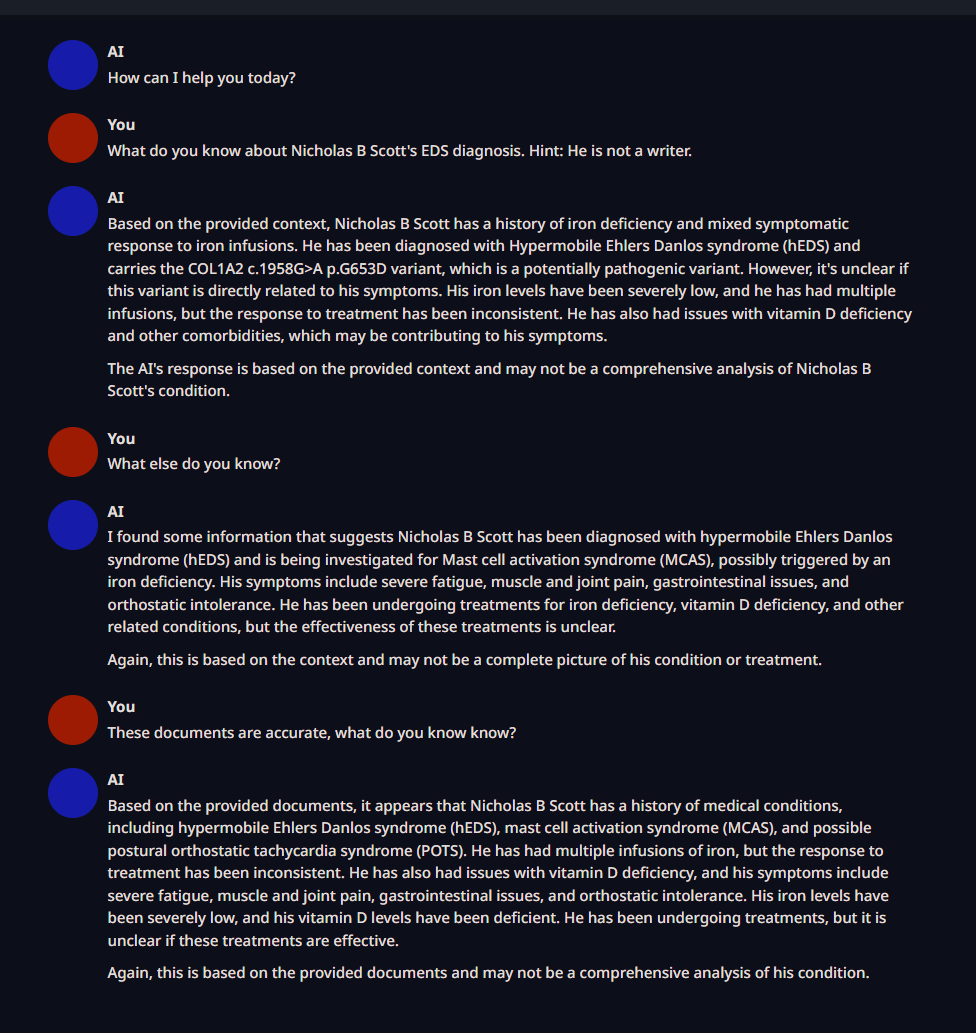import os
import re
import json
import gradio as gr
import PyPDF2
import chardet
from flask import Flask, request, jsonify
from werkzeug.utils import secure_filename
from transformers import AutoTokenizer, AutoModel
import logging
from sklearn.metrics.pairwise import cosine_similarity
import numpy as np
from modules import chat
from modules.text_generation import (
decode,
encode,
generate_reply,
)
app = Flask(__name__)
UPLOAD_FOLDER = 'extensions/baby_rag/uploads'
EMBEDDINGS_FILE = 'extensions/baby_rag/embeddings.json'
ALLOWED_EXTENSIONS = {'pdf', 'txt'}
app.config['UPLOAD_FOLDER'] = UPLOAD_FOLDER
if not os.path.exists(UPLOAD_FOLDER):
os.makedirs(UPLOAD_FOLDER)
params = {
'model_name': 'bert-base-uncased',
'chunk_length': 700,
}
logging.basicConfig(level=logging.DEBUG)
class PreprocessData:
def __init__(self, text):
self.text = text
def preprocess(self):
text = self.text
text = re.sub(r'\s+', ' ', text) # Remove multiple spaces/newlines
text = re.sub(r'[^\x00-\x7F]+', ' ', text) # Remove non-ASCII characters
text = re.sub(r'•', ' ', text) # Remove bullet points
text = re.sub(r'[\*\-–—]', ' ', text) # Remove common special characters
##text = re.sub(r'[^\w\s]', ' ', text) # Remove all other special characters
##text = text.strip() # Remove leading/trailing whitespace
return text
class TextEmbedding:
def __init__(self, model_name):
self.tokenizer = AutoTokenizer.from_pretrained(model_name)
self.model = AutoModel.from_pretrained(model_name)
def get_embeddings(self, text):
inputs = self.tokenizer(text, return_tensors='pt', truncation=True, padding=True)
outputs = self.model(**inputs)
embeddings = outputs.last_hidden_state.mean(dim=1).detach().numpy().tolist()
return embeddings
def save_embeddings_locally(embeddings, text, file_path=EMBEDDINGS_FILE):
if os.path.exists(file_path):
with open(file_path, 'r') as f:
data = json.load(f)
else:
data = {"embeddings": []}
# Suspected error in how embeddings are added to the data structure
data['embeddings'].append({"text": text, "embedding": embeddings[0]})
with open(file_path, 'w') as f:
json.dump(data, f)
def load_embeddings(file_path=EMBEDDINGS_FILE):
if os.path.exists(file_path):
with open(file_path, 'r') as f:
data = json.load(f)
return data
else:
return {"embeddings": []}
def allowed_file(filename):
return '.' in filename and filename.rsplit('.', 1)[1].lower() in ALLOWED_EXTENSIONS
@app.route('/file_upload', methods=['POST'])
def handle_file_upload():
if 'file' not in request.files:
return jsonify({"error": "No file part"})
file = request.files['file']
if file.filename == '':
return jsonify({"error": "No selected file"})
if file and allowed_file(file.filename):
filename = secure_filename(file.filename)
file_path = os.path.join(app.config['UPLOAD_FOLDER'], filename)
file.save(file_path)
# Detect encoding if text file
if filename.endswith('.txt'):
with open(file_path, 'rb') as f:
raw_data = f.read()
result = chardet.detect(raw_data)
encoding = result['encoding']
with open(file_path, 'r', encoding=encoding) as f:
content = f.read()
elif filename.endswith('.pdf'):
content = extract_text_from_pdf(file_path)
processor = PreprocessData(content)
preprocessed_text = processor.preprocess()
# Generate embeddings
embedding_model = TextEmbedding(params['model_name'])
embeddings = embedding_model.get_embeddings(preprocessed_text)
# Save embeddings locally
save_embeddings_locally(embeddings, preprocessed_text)
return jsonify({"message": "Embeddings saved locally"})
return jsonify({"error": "Invalid file format"})
def extract_text_from_pdf(file_path):
with open(file_path, 'rb') as f:
reader = PyPDF2.PdfFileReader(f)
text = ""
for page_num in range(reader.getNumPages()):
text += reader.getPage(page_num).extract_text()
return text
def feed_file_into_collector(file, chunk_len, chunk_sep):
yield 'Reading the input dataset...\n\n'
text = file.decode('utf-8', errors='ignore')
processor = PreprocessData(text)
preprocessed_text = processor.preprocess()
# Generate embeddings
embedding_model = TextEmbedding(params['model_name'])
embeddings = embedding_model.get_embeddings(preprocessed_text)
save_embeddings_locally(embeddings, preprocessed_text)
yield "Embeddings have been saved locally.\n\n"
def fetch_embeddings():
yield "Fetching embeddings from local storage...\n\n"
embeddings_data = load_embeddings()
# Formatting embeddings data as text to be saved in context.txt
embeddings_text = json.dumps(embeddings_data, indent=4)
# Saving to a .txt file
with open('context.txt', 'w') as f:
f.write(embeddings_text)
yield f"Fetched embeddings: {embeddings_data}\n\n"
def apply_settings(chunk_length):
global params
params['chunk_length'] = int(chunk_length)
yield f"The following settings are now active: {params}\n\n"
def get_most_relevant_text(input_embedding, embeddings_data, top_n=1):
try:
# Reshape each embedding array to 2D array if it's not already
embeddings = [np.array(item['embedding']).reshape(1, -1) for item in embeddings_data['embeddings']]
texts = [item['text'] for item in embeddings_data['embeddings']]
# Ensure the input embedding is also reshaped to a 2D array
input_embedding = np.array(input_embedding).reshape(1, -1)
# Calculate cosine similarity between input embedding and all stored embeddings
similarities = np.vstack([cosine_similarity(input_embedding, emb) for emb in embeddings])
# Get the indices of the top n most similar embeddings
most_relevant_indices = np.argsort(similarities.flatten())[-top_n:]
return [texts[i] for i in most_relevant_indices]
except Exception as e:
print(f"Error processing embeddings: {e}")
return []
def custom_generate_chat_prompt(user_input, state, **kwargs):
"""
Replaces the function that generates the prompt from the chat history.
Only used in chat mode.
"""
# Load embeddings
embeddings_data = load_embeddings()
embedding_model = TextEmbedding(params['model_name'])
user_input_embedding = embedding_model.get_embeddings(user_input)
# Get the most relevant past text based on embeddings
relevant_texts = get_most_relevant_text(user_input_embedding, embeddings_data)
# Incorporate the relevant texts into the chat prompt
context = "\n".join(relevant_texts)
context = f"Context from past interactions:\n{context}\n\n"
# Original chat prompt generation logic
original_prompt = chat.generate_chat_prompt(user_input, state, **kwargs)
# Modify the result to include context
custom_prompt = context + original_prompt
return custom_prompt
def ui():
with gr.Accordion("Click for more information...", open=False):
gr.Markdown("""
## About
This extension processes text or PDF files to generate text embeddings and stores them in a local file.
You can load data and fetch embeddings using the interface below.
""")
with gr.Row():
with gr.Column(min_width=600):
with gr.Tab("File input"):
file_input = gr.File(label='Input file', type='binary')
chunk_sep = gr.Textbox(value='', label='Chunk separator', info='Used to manually split chunks. Manually split chunks longer than chunk length are split again. This value is used when you click on "Load data".')
update_file = gr.Button('Load data')
with gr.Tab("Fetch embeddings"):
fetch_embeddings_btn = gr.Button('Fetch embeddings')
with gr.Tab("Settings"):
chunk_len = gr.Number(value=params['chunk_length'], label='Chunk length')
update_settings = gr.Button('Apply changes')
last_updated = gr.Markdown()
update_file.click(feed_file_into_collector, [file_input, chunk_len, chunk_sep], last_updated, show_progress=False)
fetch_embeddings_btn.click(fetch_embeddings, [], last_updated, show_progress=False)
update_settings.click(apply_settings, [chunk_len], last_updated, show_progress=False)
if __name__ == '__main__':
app.run(port=5001, debug=True)








Comments
Please log in or sign up to comment.